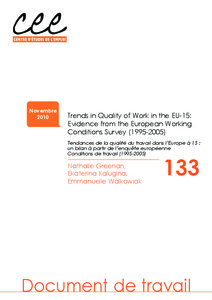Trends in quality of work in the EU-15: evidence from the European Working Conditions Survey (1995-2005)

Greenan, Nathalie ; Kalugina, Ekaterina ; Walkowiak, Emanuelle
Centre d'études de l'emploi et du travail, Noisy-le-Grand
CEET - Noisy-le-Grand
2010
38 p.
comparison ; job satisfaction ; quality of working life ; statistics ; survey ; working conditions
Document de travail
133
Working conditions
English
Bibliogr.
"This paper has three main objectives: to provide a mapping of quality of work across European countries, to measure its evolution between 1995 and 2005 and to explain the observed trends. This general assessment of quality of work is based on three waves of European Working Conditions Surveys carried out with employed persons in 1995, 2000 and 2005. We analyze the quality of work by measuring the working conditions as well as the intensity and complexity of the work. We find evidence of a decreasing trend in the quality of work in the EU-15 over the 1995-2005 period. Over that period, quality of working conditions has deteriorated, while at the same time, technical and market constraints have become more intense and work complexity has decreased. It is known that work contexts that are very demanding, with high work intensity and low decision latitude, generate stress. Thus, we may infer from the work intensity and complexity trends that mental strain has been on the rise in Europe, while physical working conditions have not improved. To understand the observed trends, we investigate country-level and individual-level heterogeneity in quality of work indicators using multilevel modeling. This permits measuring the sensitivity of descriptive trends to composition effects and testing the significance of “country effects”."
Digital
The ETUI is co-funded by the European Union. Views and opinions expressed are however those of the author(s) only and do not necessarily reflect those of the European Union or the ETUI.